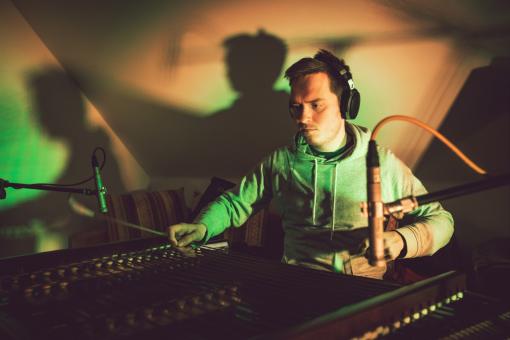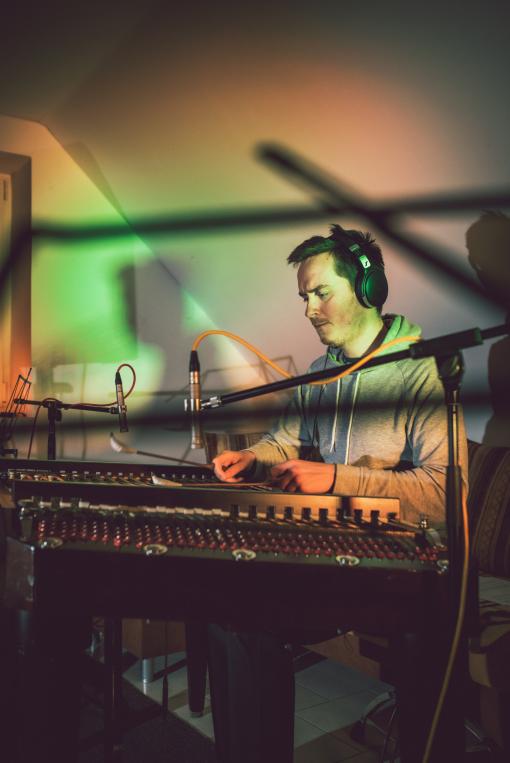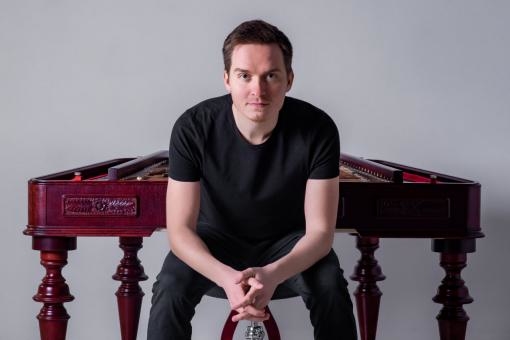On this very day (19 May) an event will start in Valašské Meziříčí which all the dulcimer players from almost all over the world have been looking forward to for two years. It is the 14th International Dulcimer Festival, which has been held in this town every odd year since 1995. This year, it is sure to be rather modest due to the pandemic situation; the organizers are going to stream some of the concerts, while others will be broadcast on the Czech Radio stations Vltava and Brno. This year, Michal Grombiřík, a dulcimer player, became the first ever such musician admitted to the Jazz Music Interpretation Department of the Janáček Academy of Music and Performing Arts (JAMU). What is the path from a traditional folk song, through classical music to jazz music, and what exactly is Michal going to do at the aforementioned dulcimer festival? We covered all these topics in our conversation.
Michal, like most of the dulcimer players, you started with playing in a folk music ensemble. What was your journey from folklore to jazz music, actually?
First of all, I need to say that I am not a jazz dulcimer player. That said, at least at the stage I am in now, that is not what I can call it. I try to direct myself this way. I started in a children’s dulcimer music in Hodonín when I was about ten or so. Like maybe any other dulcimer players. While I was never a member of any ensemble, I have performed in a couple of folk music bands.
In fact, I started to discover jazz slowly in the second or third year when I was a conservatory student. I actually can’t remember the very beginning; it happened rather gradually.
Were you inspired by any particular artist?
Marcel Comendant was certainly a key person. He inspired me through recordings initially. I listened to his work with the PaCoRa Trio. I was absolutely fascinated by it, and I did not understand what they were playing whatsoever. But in some way I felt that it was really honest, good and thoughtful how they played. On this basis, I also became more interested in the jazz tradition.
Did you use it back then in your playing?
It happened gradually. We founded the Midnight Coffee Session band in Brno in 2009. There, we gradually started to add some jazz standards to folklore music, one step at a time. But in fact, I did not take it too seriously until my final exam, when I played one jazz standard as an additional piece. That was the first time I started dealing with it a little more honestly.
And then I started to go to Slovakia to attend courses held by Marcel Comendant himself. At that time, thanks to getting in touch with him, I started to devote myself to jazz music a little more, but still, in fact, marginally. In the meantime, I devoted myself to folklore a lot, in addition to, naturally, classical music, contemporary music. This is how inconsistent it was and how interrupted it was for some time. It was only three years ago that I decided that this was actually the road that attracted me. I had absorbed jazz music sufficiently through listening and told myself jazz was the right thing for me. So I made a deal with Marcel and went to his place periodically for private sessions for about a year. It was there where the direct relationship with the interpretation of jazz music was established.
Was it back then you decided to study jazz interpretation at university?
I thought a lot about where to go to study because I was really influenced by both folklore and classical music. I was unable to find a way myself. I had a lot of work and I didn’t have any internal drive. I thought I needed a mentor to guide me. I was considering schools in Berlin or Katowice. It was not possible to study it in our country, at any jazz department in Prague or Brno. Courses were opened only for big band instruments. But in the end, the opportunity was given a green light in both Prague and Brno’s JAMU. So then my jazz journey really began.
Had the conditions in the academies changed somehow, so that they began to admit players of other instruments?
As part of their new accreditation, they decided to open one available course where one could apply for a different instrument, upon consultation.
I read about it and wrote to Vilém Spilka right away. He replied that I should come and bring my dulcimer. So I decided at some point in November that I would try it; there was an admission exam in February and they admitted me.
Let's talk about this year’s dulcimer festival in Valašské Meziříčí, which starts this week. In what way will you be involved this year?

I am going to attend this year’s festival as an accompanying teacher because my two students from the primary art school in Velké Pavlovice will be trying to compete this year for the first time. After the COVID situation and after the whole system has been disrupted, this is a rather interesting process. Their motivation has completely diminished. Out of nothing, one is supposed to fire up their desire to compete. I think that this year, it will be quite different for everyone in this respect unlike the previous years.
So you won’t play this year?
On Friday, Daniel Skála will present new dulcimer school literature. It’s called “Cimbalovánky” (loosely translated as “Colouring with Dulcimers”). It is a very innovative involvement with improvisation, among other things, and all of an atonal nature. In essence, a completely new approach to a dulcimer school. So Gabriela Tannert and I should play something from the textbook out there.
On Sunday morning, I will perform the final concert with my pet project.
It is a band that came into being last year. I dreamed it up a little because I always played like a sideband, the guy in the background. That’s why I was tempted to have my own project, to start expressing myself with music. That’s how I got this down, which was before the COVID situation started, actually. Matěj Štefík on drums, Robin Lefner on violin and mandolin, Honza Galia on double-bass and trombone, Tereza Kropíková singing and myself as a dulcimer player. It is not any ground-breaking idea. It involves author processing of traditional folk songs into a specific format. I started to do these arrangements according to what’s closest to me as a musician.
So is it all about your arrangements?
In addition to two modifications, they are mine. Now we have an hour’s repertoire. I give everyone their space, but so far it’s in the beginning stages.
Will it be your first concert?
There was already one in Hodonín. We had some festivals arranged and then, of course, it all was interrupted. So, a second concert after a long time.
What music can listeners look forward to in your presentation?
Folk songs are the basis, but there are strong jazz influences; it is built on a strong groove. It is simply a fusion of jazz, groove and electronics against the background of folk songs. But we don’t have a band name yet. So if one of your readers were to come up with something, they can write to me.
The dulcimer community is quite specific and seems coherent. Are there events other than the festival behind that?
There are certainly dulcimer courses. We’re trying to get children from everywhere to enrol to prevent the very same kids attending over and over, which perhaps is paying off, step by step. In the past, they were done by Jarda Kneisl and Růžena Děcká. Now Dan Skála and I are doing everything in what is something as a tandem. We’re trying to invite the best instructors we know. Among these, we are trying to include others who are not dulcimer players. Last year, it was pianist Jiří Hrubý and, formerly, composer Jana Vöröšová. It’s about getting an opinion and perspective of someone from the outside, so that the dulcimer community won’t become closed-in.
We will be improvising a lot, we will be teaching the kids to listen, there will be a creative approach to the music and arts in general. Let’s hope that everything goes well. The kids leave the courses excited, unleashed through listening. Even if they lose some of it during their holidays, their teachers will have a lot to build on in primary art schools.

And what else are you preparing for the summer?
I will now focus mainly on the band that I mentioned. While most of things have been cancelled for the holidays, I’m preparing other things. And I, as an artist, plan only for courses that take place within the Ostrava Days of New Music (Ostravské dny nové hudby), an intense, two-week course with guests from abroad, and then a festival for a week focused on contemporary music. I’m going there as a course participant, to get inspired, to gather some experience.
In August, I have one more thing, a minor cooperation with the Music Marathon. And we’re also going to hold concerts with ConTRIOlogy, a trio of players. We are just finishing a small project of freely improvised compositions by Leoš Janáček and plan to introduce it at the end of the summer. Well, and then I am going to enter the Faculty of Music at JAMU.
I’m keeping my fingers crossed for your studies. Would you like to add something to that at the end?
It is the first time we can study jazz music with a dulcimer. It is definitely an interesting milestone for the instrument. It has a strong presence in folklore, classical music, mainly contemporary music, but in fact it has almost no representation in jazz here. I will try to cut off from the folklore because, while interaction is fine, what I would like to achieve is to strictly separate the two genres. I am, of course, limited by this instrument, but I would like to do so at least in my head.

































No comment added yet..